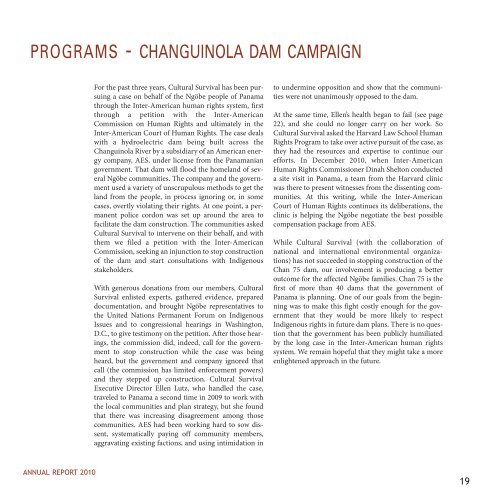Annual Report 2010 - Cultural Survival
Annual Report 2010 - Cultural Survival
Annual Report 2010 - Cultural Survival
You also want an ePaper? Increase the reach of your titles
YUMPU automatically turns print PDFs into web optimized ePapers that Google loves.
PROGRAMS - CHANGUINOLA DAM CAMPAIGN<br />
ANNUAL REPORT <strong>2010</strong><br />
For the past three years, <strong>Cultural</strong> <strong>Survival</strong> has been pursuing<br />
a case on behalf of the Ngöbe people of Panama<br />
through the Inter-American human rights system, first<br />
through a petition with the Inter-American<br />
Commission on Human Rights and ultimately in the<br />
Inter-American Court of Human Rights. The case deals<br />
with a hydroelectric dam being built across the<br />
Changuinola River by a subsidiary of an American energy<br />
company, AES, under license from the Panamanian<br />
government. That dam will flood the homeland of several<br />
Ngöbe communities. The company and the government<br />
used a variety of unscrupulous methods to get the<br />
land from the people, in process ignoring or, in some<br />
cases, overtly violating their rights. At one point, a permanent<br />
police cordon was set up around the area to<br />
facilitate the dam construction. The communities asked<br />
<strong>Cultural</strong> <strong>Survival</strong> to intervene on their behalf, and with<br />
them we filed a petition with the Inter-American<br />
Commission, seeking an injunction to stop construction<br />
of the dam and start consultations with Indigenous<br />
stakeholders.<br />
With generous donations from our members, <strong>Cultural</strong><br />
<strong>Survival</strong> enlisted experts, gathered evidence, prepared<br />
documentation, and brought Ngöbe representatives to<br />
the United Nations Permanent Forum on Indigenous<br />
Issues and to congressional hearings in Washington,<br />
D.C., to give testimony on the petition. After those hearings,<br />
the commission did, indeed, call for the government<br />
to stop construction while the case was being<br />
heard, but the government and company ignored that<br />
call (the commission has limited enforcement powers)<br />
and they stepped up construction. <strong>Cultural</strong> <strong>Survival</strong><br />
Executive Director Ellen Lutz, who handled the case,<br />
traveled to Panama a second time in 2009 to work with<br />
the local communities and plan strategy, but she found<br />
that there was increasing disagreement among those<br />
communities. AES had been working hard to sow dissent,<br />
systematically paying off community members,<br />
aggravating existing factions, and using intimidation in<br />
to undermine opposition and show that the communities<br />
were not unanimously opposed to the dam.<br />
At the same time, Ellen’s health began to fail (see page<br />
22), and she could no longer carry on her work. So<br />
<strong>Cultural</strong> <strong>Survival</strong> asked the Harvard Law School Human<br />
Rights Program to take over active pursuit of the case, as<br />
they had the resources and expertise to continue our<br />
efforts. In December <strong>2010</strong>, when Inter-American<br />
Human Rights Commissioner Dinah Shelton conducted<br />
a site visit in Panama, a team from the Harvard clinic<br />
was there to present witnesses from the dissenting communities.<br />
At this writing, while the Inter-American<br />
Court of Human Rights continues its deliberations, the<br />
clinic is helping the Ngöbe negotiate the best possible<br />
compensation package from AES.<br />
While <strong>Cultural</strong> <strong>Survival</strong> (with the collaboration of<br />
national and international environmental organizations)<br />
has not succeeded in stopping construction of the<br />
Chan 75 dam, our involvement is producing a better<br />
outcome for the affected Ngöbe families. Chan 75 is the<br />
first of more than 40 dams that the government of<br />
Panama is planning. One of our goals from the beginning<br />
was to make this fight costly enough for the government<br />
that they would be more likely to respect<br />
Indigenous rights in future dam plans. There is no question<br />
that the government has been publicly humiliated<br />
by the long case in the Inter-American human rights<br />
system. We remain hopeful that they might take a more<br />
enlightened approach in the future.<br />
19


